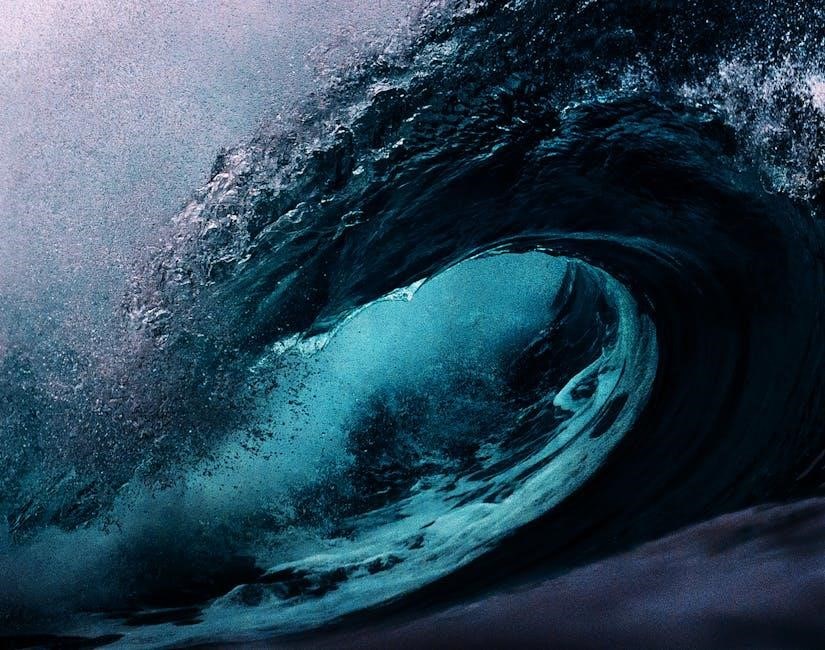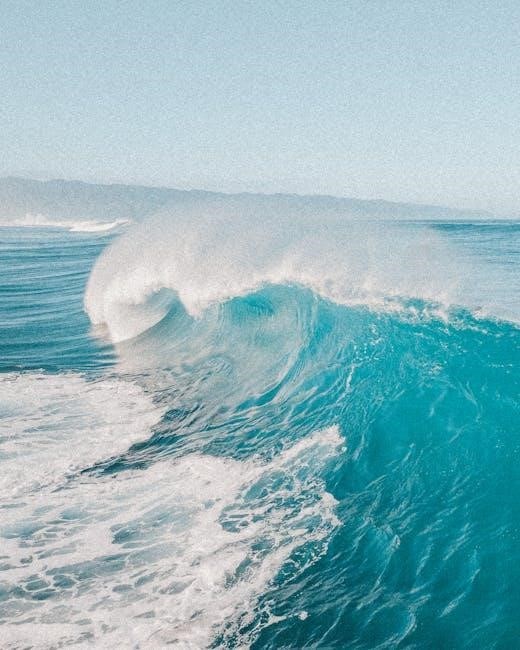Energy efficiency in water heaters is crucial for reducing energy consumption and lowering utility bills. Modern water heaters offer advanced technologies to minimize energy use while providing consistent hot water supply‚ making them environmentally friendly and cost-effective solutions for homes and businesses.
1.1 Importance of Energy Efficiency in Water Heaters
Energy efficiency in water heaters is vital for reducing energy consumption‚ lowering utility bills‚ and minimizing environmental impact. As water heating accounts for a significant portion of household energy use‚ improving efficiency can lead to substantial cost savings and reduced greenhouse gas emissions. Efficient water heaters also extend product lifespan and promote sustainable energy use‚ making them a smart choice for eco-conscious homeowners and businesses.
1.2 Overview of Water Heater Types
Water heaters come in various types‚ each offering unique benefits and efficiency levels. Tank water heaters store hot water‚ while tankless models heat water on demand‚ saving space and energy. Heat pump water heaters use ambient heat for efficiency‚ and solar models harness renewable energy. Each type suits different needs‚ from space constraints to energy preferences‚ allowing homeowners to choose a system that balances cost‚ efficiency‚ and performance. Understanding these options helps make informed decisions for energy-efficient water heating solutions.

Types of Water Heaters
Water heaters are categorized into tank‚ tankless‚ heat pump‚ and solar types. Each offers distinct features like storage‚ on-demand heating‚ energy efficiency‚ and renewable energy usage.
2.1 Tank Water Heaters
Tank water heaters are the most common type‚ storing hot water in an insulated tank. They are available in gas‚ electric‚ and oil models‚ offering consistent supply. Capacities range from 20 to 100 gallons‚ suiting various household needs. While they are affordable upfront‚ standby heat loss can reduce efficiency. Modern models feature improved insulation and higher energy efficiency ratings‚ minimizing energy waste. Proper sizing and maintenance are crucial for optimal performance and longevity.
- Available in gas‚ electric‚ and oil models.
- Capacities range from 20 to 100 gallons.
- Improved insulation in modern models.
2.2 Tankless Water Heaters
Tankless water heaters heat water on demand without storing it‚ offering higher energy efficiency and significant space savings. They activate when a tap is opened‚ heating water as it flows through internal coils. This design reduces standby heat loss‚ common in tank models. While initial costs are higher‚ tankless heaters often last longer and provide lower energy bills over time. Proper sizing and installation are essential for optimal performance and efficiency‚ ensuring consistent hot water supply. Modern models also offer advanced customization options.
- Heats water on demand‚ eliminating standby loss.
- Typically lasts 15-20 years‚ doubling tank heater lifespan.
- Space-saving design ideal for smaller spaces.
- Higher initial cost but long-term savings.
2.3 Heat Pump Water Heaters
Heat pump water heaters transfer heat from the surrounding air to water‚ operating more efficiently than traditional models. They are ideal for warm climates and can be installed indoors or outdoors. With high Uniform Energy Factor (UEF) ratings‚ these heaters significantly reduce energy consumption. They are environmentally friendly‚ lowering greenhouse gas emissions and utility bills. While initial costs are higher‚ long-term savings and potential rebates make them a smart investment for energy-conscious homeowners seeking reliable hot water solutions.
- Transfers heat from air to water‚ enhancing efficiency.
- Higher UEF ratings for improved energy performance.
- Suitable for warm climates and indoor/outdoor use.
- Eligible for rebates and incentives.
2.4 Solar Water Heaters
Solar water heaters use sunlight to heat water‚ offering a renewable and sustainable energy solution. They consist of solar panels and a storage tank‚ reducing reliance on electricity or gas. Ideal for sunny regions‚ these systems lower utility bills and environmental impact. While initial installation costs are higher‚ long-term savings and incentives like rebates make them a viable option for eco-conscious homeowners seeking energy efficiency and reduced greenhouse gas emissions.
- Converts sunlight into heat energy for water.
- Reduces reliance on non-renewable energy sources.
- Eligible for rebates and tax incentives.
Energy Efficiency Metrics
Energy efficiency metrics measure how effectively water heaters convert energy into hot water. Key factors include UEF‚ EF‚ and EnergyGuide labels‚ helping consumers evaluate efficiency and savings potential.
3.1 Uniform Energy Factor (UEF)
The Uniform Energy Factor (UEF) measures a water heater’s efficiency by considering how much energy it uses to produce hot water. A higher UEF indicates greater efficiency‚ with ENERGY STAR-certified models often having higher ratings. UEF is calculated based on the heater’s energy consumption and output over a typical day‚ helping consumers compare different models effectively. Federal regulations require UEF ratings for all water heaters‚ ensuring transparency and promoting energy-saving choices.
3.2 Energy Factor (EF)
The Energy Factor (EF) is a measure of a water heater’s efficiency‚ calculated by comparing the energy delivered to the energy consumed. Higher EF values indicate greater efficiency. Unlike UEF‚ EF does not account for standby losses in storage tank models. It is used for both tank and tankless water heaters‚ providing a straightforward way to evaluate energy performance. EF helps consumers identify models that balance energy use and water heating needs effectively‚ supporting informed purchasing decisions. This metric remains a key factor in assessing water heater efficiency.
3.4 EnergyGuide Label
The EnergyGuide label is a crucial tool for comparing water heaters’ energy efficiency. Displayed on all new water heaters‚ it shows the product’s energy consumption and estimated annual operating costs. This black and yellow label helps consumers evaluate energy usage and costs‚ enabling informed decisions. It highlights the environmental impact and financial savings of choosing energy-efficient models. By reviewing the EnergyGuide label‚ homeowners can make smarter choices that align with their energy-saving goals and budget requirements effectively.

Factors to Consider When Choosing a Water Heater
Choosing the right water heater involves considering size‚ fuel type‚ upfront costs‚ and long-term savings. Smart technology and customization options also play a key role.
4.1 Sizing and Capacity
Proper sizing and capacity are essential for a water heater to meet household needs without excess energy use. A unit too small may not supply enough hot water‚ while an oversized one wastes energy. Consider the number of people‚ peak usage times‚ and flow rates to select the right size. This balance ensures efficiency and satisfaction‚ avoiding unnecessary costs and resource consumption.
4.2 Fuel Type and Energy Source
Fuel type and energy source significantly impact a water heater’s efficiency and operating costs. Electric models are cost-effective to purchase but may have higher energy expenses. Gas heaters offer faster heating but require proper ventilation. Heat pump water heaters use ambient heat‚ making them highly efficient. Solar water heaters are eco-friendly but depend on sunlight. Choosing the right fuel type and energy source balances upfront costs‚ long-term savings‚ and environmental impact‚ ensuring optimal performance for your household needs.
4.3 Initial Cost vs. Long-Term Savings
Choosing a water heater involves balancing initial costs and long-term savings. Energy-efficient models‚ like heat pumps or solar heaters‚ often have higher upfront costs but deliver significant savings over time. For example‚ ENERGY STAR-certified heaters can reduce annual energy bills by up to $600. Tankless and high-efficiency gas heaters also offer lower operating costs and longer lifespans. While the initial investment may be higher‚ the long-term savings and reduced energy consumption make these options more economical and environmentally friendly over the heater’s lifespan. Proper selection ensures financial and energy efficiency benefits.
4.4 Smart Technology and Customization
Modern water heaters now feature smart technology and customization options to enhance energy efficiency and user convenience. Advanced models allow users to set schedules‚ monitor energy usage‚ and adjust temperatures remotely via smartphone apps. Some systems‚ like Calas smart water heaters‚ operate only when needed‚ reducing standby energy loss. Customizable settings ensure optimal performance tailored to household needs‚ balancing comfort and energy savings. These innovations make water heaters more efficient and user-friendly‚ aligning with today’s demand for smart home solutions.

Energy-Saving Tips for Water Heater Usage
Lowering temperature settings‚ insulating pipes‚ fixing leaks‚ and maintaining proper installation can significantly reduce energy consumption and extend the lifespan of your water heater while saving costs.
5.1 Lowering the Temperature Setting
Lowering your water heater’s temperature setting to 120°F can significantly reduce energy consumption and prevent overheating. This adjustment minimizes standby heat loss and prolongs the heater’s lifespan. Many modern water heaters come with temperature controls‚ making it easy to optimize settings. Additionally‚ reducing the temperature helps prevent scalding‚ enhancing safety‚ especially for households with children. This simple change can lead to noticeable savings on utility bills while maintaining ample hot water supply for daily needs.
5.2 Insulating the Water Heater and Pipes
Insulating your water heater and pipes is a simple yet effective way to improve energy efficiency. Proper insulation reduces heat loss‚ ensuring that hot water stays warm longer and reducing the need for constant reheating. Wrap your water heater with insulation blankets or jackets‚ and use foam or fiberglass sleeves for exposed pipes. This not only lowers energy bills but also provides consistent water temperatures. Insulation is especially beneficial in unheated areas like basements or crawlspaces. Always follow manufacturer guidelines to avoid overheating risks.
5.3 Fixing Leaks and Dripping Taps
Fixing leaks and dripping taps is essential for energy efficiency. Leaks force your water heater to work harder‚ increasing energy consumption. Even a single dripping faucet can waste significant hot water over time. Addressing leaks promptly reduces energy bills and lowers water usage. Regularly inspect taps‚ pipes‚ and connections for any signs of drips or wear. Replacing worn-out washers or installing low-flow fixtures can prevent leaks and save energy. This simple maintenance step contributes to both cost savings and environmental conservation;
5.4 Maintaining Proper Installation and Service
Proper installation and regular maintenance are vital for optimizing water heater efficiency. Ensuring the unit is installed correctly guarantees safety and performance. Regular servicing‚ such as checking temperature settings and inspecting for wear‚ helps prevent issues. Replacing worn-out parts and cleaning components can improve efficiency and extend lifespan. Professional installation and maintenance also ensure compliance with safety standards‚ reducing energy waste and operational risks. Proper upkeep enhances energy efficiency‚ lowers utility bills‚ and minimizes environmental impact‚ making it a cornerstone of sustainable water heating solutions.

Environmental Impact and Energy Savings
Energy-efficient water heaters reduce greenhouse gas emissions and lower energy consumption‚ promoting eco-friendly practices and offering long-term cost savings for homeowners.
6.1 Reducing Greenhouse Gas Emissions
Energy-efficient water heaters significantly reduce greenhouse gas emissions by minimizing energy consumption. Models like heat pump water heaters transfer heat instead of generating it‚ lowering carbon footprints. ENERGY STAR-certified units further reduce emissions by using advanced technologies. Upgrading to efficient models cuts energy waste‚ helping the environment and promoting sustainability. These eco-friendly solutions are essential for reducing a home’s overall environmental impact.
6.2 Lowering Utility Bills
Energy-efficient water heaters can significantly reduce utility bills by minimizing energy consumption. High-efficiency models‚ such as heat pump water heaters‚ use less energy to produce hot water. ENERGY STAR-certified units also offer substantial savings. By reducing standby heat loss and optimizing heating processes‚ these systems lower monthly energy costs. Smart water heaters with customization options further enhance savings by operating only when needed. Upgrading to an efficient model can lead to long-term financial benefits while maintaining consistent hot water supply.
6.3 Extended Lifespan of Energy-Efficient Models
Energy-efficient water heaters often have a longer lifespan compared to traditional models due to their advanced design and superior‚ energy-efficient materials. Heat pump and tankless models‚ for instance‚ are known for their durability and resistance to wear and tear. These units typically have fewer moving parts‚ which reduces the likelihood of mechanical failures. Regular maintenance and proper installation further enhance their longevity. By investing in an energy-efficient water heater‚ homeowners can enjoy long-term savings and reduced frequency of replacements.
